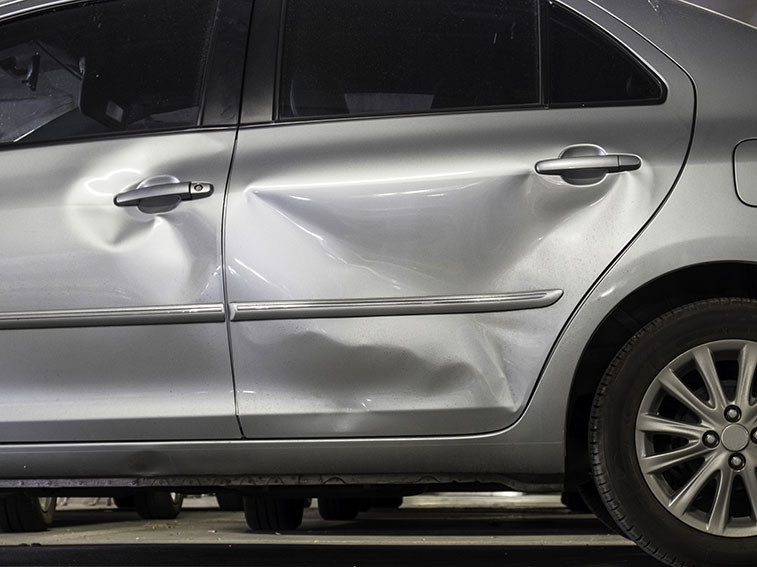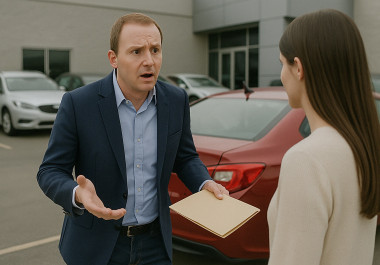There are few things in life that are worse than that sinking feeling you get when you discover unexpected damage on your newly-bought car. It’s bad enough when it’s just a scratch or a mark, but even worse when it’s more substantial body or mechanical damage.
Now, something like this is generally less of a concern when you’re buying a salvage car from one of our online car auctions, but if you’ve bought it in person from a private seller or even a professional car dealer, it makes sense that you’d want to know what your legal options are. And one of the first questions you’ll want to know is - does the seller have to declare damage on a car?
Buying from a private seller
We’ll level with you - if you’re buying directly from a private seller, it can be really tricky to get a satisfactory resolution on this kind of dispute, unless you can somehow conclusively prove that they’ve lied to you or misled you about the overall condition of the car.
This is chiefly because private sellers aren’t viewed as automotive professionals in the eyes of the law, and they can’t necessarily be expected to have the kind of expertise and experience that would allow them to identify most types of issues.
In order to get any kind of recompense for a car that you didn’t know was damaged, you’d need written proof that they declared it wasn’t damaged. This could be in the form of an email for example, or the original advert if it ever made such a claim. If would also strengthen your claim if you could present proof that they were knowingly misleading you about the car’s condition, such as any receipts for repairs undertaken while they still owned the vehicle.
Buying from a professional dealership
Things become a bit easier for you when it comes to car dealerships, but only slightly. Unlike private sellers, it’s fair for consumers to expect that professional car dealers know what they’re talking about, so they’re bound by the Consumer Protection from Unfair Trading Regulations 2008.
But while you have a bit more consumer protection, the wording of the law still leaves a lot open to interpretation. Essentially, it concerns itself with anything that would cause the consumer to buy the car, when they might not have done otherwise. Unexpected or undisclosed damage to the car is an excellent example.
However, you’ll note that this is an incredibly vague definition, which is why it can still be incredibly difficult to prove fault, even in what might seem like fairly clear-cut cases. This is partially because different consumers would have different standards of what’s acceptable. One buyer might not be fussed about a few scratches here and there if they thought they were getting a good deal, but to another person, even the slightest mark or scuff could cause them to entirely abandon all plans of buying it.
In a nutshell, the harsh truth is that what seems objectively unfair to you might not be seen in the same light by the courts, so it’s wise to be as thorough as you can in your checks of the car before you buy it.
 What about insurance write-offs?
What about insurance write-offs?
There’s no law against selling cars that have been declared write-offs - just as well, or that would be a large proportion of our business gone here at RAW2K!
We’ve given you a detailed breakdown of the various salvage titles before, but we’ll also provide a quick recap here. Basically, when a car is written off, it’s assigned one of four salvage titles, in order to provide a rough indication of the level of damage it’s suffered.
There four salvage titles include:
- Category N cars (non-structural damage)
- Category S cars (significant structural damage)
- Category B cars (scrap only, although parts may be removed)
- Category A cars (strictly scrap only)
Only Category N and Category S cars can legally be sold, as cars in the other two categories have sustained damage that’s too severe for them to be safely driven again, and therefore must be scrapped.
But while Category S and Category N cars can be sold, they must be clearly identified as such by the seller at the point of sale - in other words, they’ve got to tell you without prompting, not only after they’ve been asked.
A new car having a bit of scratch on one side is very distinct to one that’s been explicitly written off by the Association of British insurers. The car’s classification also must be noted in a history check on the vehicle, so it should show up on an HPI check. That allows you to make an informed decision of whether you want to buy it.
How to protect yourself when you buy a car
So, how can you protect yourself from nasty surprises? Well to be honest, it’s mostly about being cautious during the sale. It’s a good idea to get an email address and ask them in writing whether the car has had any repair work, so that you have a written correspondence to refer back to if necessary. Verbal assurances can be easily denied, and hearsay is no good in court!
Plus, it’s important to trust your instincts - if you have reason to believe the seller might be hiding something from you, or they seem evasive for whatever reason, don’t hesitate to walk away. Try to resist any hard sells if you’re less than 100% certain of the quality of what you’re buying. Remember, once you pay the money and take possession of the car, you’re implicitly accepting to buy the car as-is. Once it’s in your possession, legal proceedings automatically become a whole lot more difficult to pursue.
If you’ve already bought the car and you’re not happy, your best bet is to gather up as much documentation as you can to support your case. If you can, it’s a good idea to get a copy of the original advert for the vehicle, and any written correspondence you exchanged with the seller. It’s also not a bad idea to have a written declaration from a third party garage or automotive expert which states their opinion that the car was clearly repaired contrary to the seller’s claims. With all that to hand - and some solid legal advice - you may have a shot.
Here at RAW2K, we’ve made sure to make everything as simple and straightforward as possible when you buy a salvage car from our own online car auctions, minimising the risk of confusion or disputes. Each of our listings gives you an idea of the rough state of the car, including whether it’s been assigned a salvage category, whether it starts and runs, and whether it has keys, so that you can judge whether or not to buy it either as a breaker or a going concern.
Our auctions are refreshed on a daily and weekly basis, so there are always new deals to be had, and we’ve got vehicles from a range of leading manufacturers including Peugeot, Toyota and Vauxhall. Why not take a look around our site, and see what you can find?




